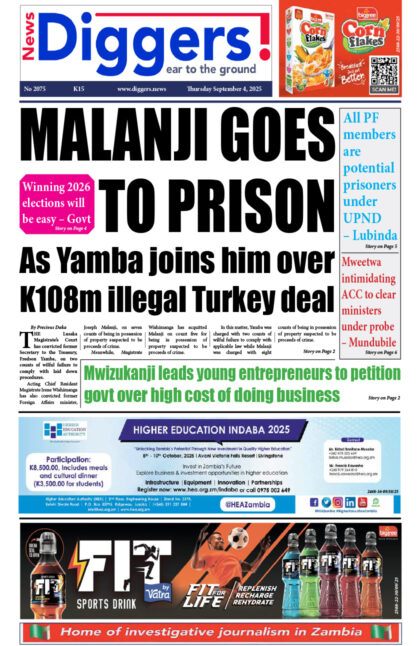The Commission of Inquiry into Voting Patterns and Electoral Violence has revealed that His Royal Highness Senior chief Mwata Kazembe, the Barotse Royal Establishment and chief Mukuni practiced active politics and influenced voting in their respective areas during the 2016 general election.
The 15-member Commission, which was chaired by Justice Munalula Lisimba, noted in its report that some traditional leaders influenced the voting pattern by instructing their subjects to campaign and vote for identified political parties.
According to the Report, petitioners submitted that some traditional leaders even threatened to apply sanctions against their subjects who campaigned for or against particular political parties.
“In Mwansabombwe District, petitioners submitted that there was interference from His Royal Highness senior chief Mwata Kazembe during the 2016 General Election. Several petitioners submitted that the chief was de-campaigning the PF parliamentary candidate for Mwansabombwe. The petitioners submitted that the chief did not want the PF to campaign freely in the villages in his chiefdom. Another petitioner submitted that both the Mwansabombwe District Commissioner and senior chief Mwata Kazembe were supporting the MMD parliamentary candidate. Another petitioner, however, submitted that the interference by the chief did not affect the election results in Mwansabombwe constituency as all PF candidates at different levels still won the elections,” the Report read.
“In Livingstone District, the Treasurer for MMD submitted that chief Mukuni told her that she should behave properly like a ‘Lozi princess’ by supporting the UPND and its presidential candidate in 2016. The petitioner submitted that she was called to meet the same chief by the former Katombola MP when the chief parked his vehicle near the MMD offices. She added that in 2016, she met the chief at Mosi-o-Tunya Park with his wife and he pulled her aside and asked her about who she was campaigning for. The petitioner submitted that the chief told her to mobilize MMD ward chairmen and take them to the palace and said that she would be rewarded. She told the Commission that she declined the offer. In Limulunga District, a petitioner submitted that the Barotse Royal Establishment supported the opposition UPND in 2016 General Election.”
The Report further revealed that chief Shimukunami campaigned for UPND and even received a vehicle as gratification from the party.
“In Lufwanyama District, a petitioner submitted that chief Shimukunami was campaigning for the UPND and that the said chief received a vehicle from the party. The Commission heard from four more petitioners that the said chief threatened to banish people from the chiefdom if they voted for the PF. In the same district, another petitioner submitted that chief Fungulwe lobbied the other chiefs in the constituency to support his son who was the UPND parliamentary candidate because his chiefdom had not produced an MP since 1997. It was on this basis that the son to the chief was adopted to stand as an MP and won the election in 2016,” the report read.
“A petitioner in Mpulungu District submitted that one chief openly appealed to people to vote for the UPND in Mpulungu. He added that the UPND won a ward in chief Chitimbwa‘s chiefdom because of the involvement of one of the chiefs in campaigning for the UPND. Another petitioner, however, contradicted the above petitioner by testifying that chiefs in the area did not engage in partisan politics. He submitted that it was not true that UPND won a ward because of the support of the chief. He stated that people just voted out of their own free will as they wanted change. In Zambezi District, petitioners submitted that senior chief Ndungu was supporting the ruling PF. A petitioner submitted that the said chief‘s house was even used to host a meeting at which the PF wanted to force the UPND to withdraw from the race of Council Chairperson in order to give an opportunity to PF to win the position.”
In its observations, the Commission found that some traditional leaders played an active role in influencing voting patterns in the country, adding that the involvement of traditional leaders in partisan politics affected voting patterns by contributing to the formation of regional and tribal enclaves, political strongholds and ethnic barriers, thus deepening divisions in the country.
And in its findings, the Commission stated that some traditional leaders prevented certain political parties and candidates from campaigning in their chiefdoms and in some instances even refused to welcome such political parties to their palaces.
The Commission also stated that there were some traditional leaders who threatened to banish people they governed from their chiefdoms if they campaigned or supported a political party or candidate whom the traditional leader did not favour.
The Commission, however, recommended that government should develop guidelines for clear separation of government and party activities and clearly define the parameters of what is meant by “supporting the government of the day”.
“Regulation 3(1)(i) of the Electoral Code of Conduct in the Electoral Process Act must be strengthened to provide for clear and enforceable sanctions for erring traditional leaders; the House of Chiefs should facilitate the development of a code of ethics to guide traditional leaders on the role that they should play during elections; and government should develop guidelines for clear separation of government and party activities and clearly define the parameters of what is meant by “supporting the government of the day”,” read the Report.

























One Response
Chief Mukuni needs to campaign for HH without fear or favour